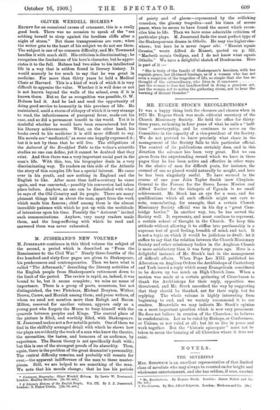OLIVER WENDELL HOLMES.*
EXCEPT for an occasional excess of ornament, this is a really good book. There was no occasion to speak of the " sea sobbing herself to sleep against the heedless cliffs after a night of storm." But these transgressions are rare; when the writer gets to the heart of his subject we do not see them. The subject is one of no common difficulty, and Mr. Townsend handles it with much skill. His criticism is discriminating ; he recognises the limitations of his hero's character, but he appre- ciates it to the full. Holmes had two sides to his intellectual life in a way that is seldom found in literary history. It would scarcely be too much to say that he was great in medicine. For more than thirty years he held a Medical Chair at Harvard. This is a kind of work of which it is very difficult to appraise the value. Whether it is well done or not is not known beyond the walls of the school, even if it is known there. But so far as recognition was possible, 0. W. Holmes had it. And he had and used the opportunity of doing good service to humanity in this province of life. He maintained, amid a storm of obloquy of which it is very strange to read, the infectiousness of puerperal fever, made out his case, and so did a permanent benefit to the world. Yet it is doubtful whether he would have been remembered but for his literary achievements. What, on the other hand, his books owed to his medicine it is still more difficult to say. His novels are" medicated," as some one happily expressed it ; but it is not by them that he will live. The obligations of the Autocrat of the Breakfast Table to the writer's scientific studies no one can define, yet it cannot be doubted that they exist. And then there was a very important social part in the man's life. With this, too, his biographer deals in a very discriminating way. To readers on this side of the Atlantic the story of this complex life has a special interest. He came over in his youth, and saw nothing in England and the English to like. After more than half-a-century he came again, and was converted,—possibly his conversion had taken place before. Anyhow, no one can be dissatisfied with what he says of the Old Country and its people. There are many pleasant things told us about the man, apart from the work which made him famous ; chief among them is the almost incredible patience with which he put up with the multitude of intrusions upon his time. Possibly the " Autocrat" invited such communications. Anyhow, very many readers made them, and the long-suffering with which he read and answered them was never exhausted.














































 Previous page
Previous page